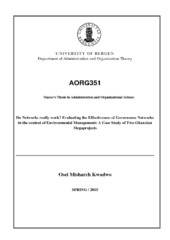| dc.description.abstract | In Ghana and elsewhere, large changes in environmental governance have occurred in recent years, moving from a hierarchical approach dominated by regulatory agencies to a more network-based approach including horizontal' contributions from multiple public and private stakeholders. This transformation as argued is resulted from the ineffectiveness of the hierarchical dominant-agency approach, particularly its weakness or lack of capacity in addressing a range of persistent environmental issues that require the co- ordination of multiple actors' and agencies as well as in-depth local knowledge about the problems. Such environmental issues included land or soil pollution, water quality planning, environmental protection of mining areas and slum growth (Sabatier et al. 2005: 3-6). Network-based approaches in recent decades have been increasingly adopted for solving these complex sets of interconnected environmental problems. The main purpose of this study was to understand and evaluate the effectiveness of governance networks with the aim to identifying the conditions and mechanisms that affect successful governance process. The study was carried out in Ghana, which compared two megaprojects dealing with environmental issues. Five variables namely collaboration, participation, deliberations, horizontal accountability, and learning and adaption were identified from the network governance theoretical approach to affect network effectiveness. The study into the two cases relied primarily on qualitative methods of data collection and analysis. That is, data for answering the research questions were obtained from multiple sources including; face-to-face interviews with the main stakeholder groups involved or connected to each project, direct observations and documentary reviews. Analysis of the data collected from the fieldwork was guided by the Layder's adaptive analytic strategy. Hence, data collected from the field study was presented through analytical descriptions after transcribing the data into texts, the data was coded into analytical units where key responses were enumerated and thematic patterns mapped to facilitate a relationship between the data and the variables. The study concludes that collaboration, participation, deliberations, accountability, and learning accounted for the relative effective governance process of PSUP and GRMA projects. These five conditions were found to be critical in embedding good processes in the projects for building sustainable results. The findings reveal these process factors are important in delivering effective foundation for achieving desired outcomes. In other words these key conditions examined here have to remain the bottom line and if network participants lose sight of these process factors, many experiments to deal with the problems will be judged a failure. This study has demonstrated that governance networks are not just about social relationships, it is about making a difference (i.e. solving problems and improving programmes), and hence the capacity of networks to realize effective collaboration, participation, deliberation, accountability, and learning are critical for building sustainable results. | en_US |
